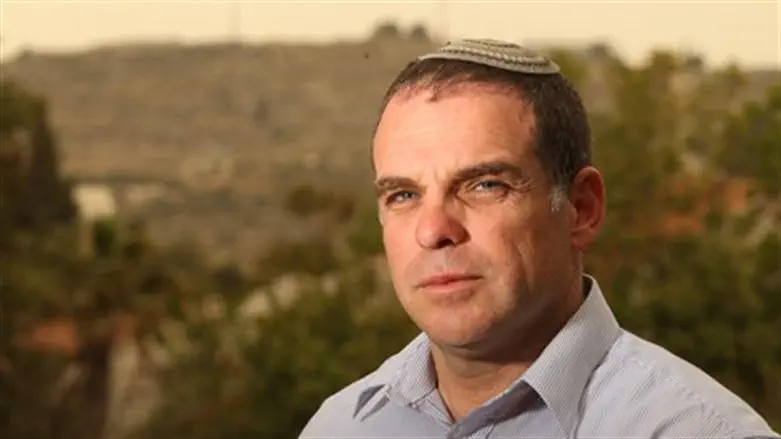
Before his UN speech, Alternate Prime Minister Yair Lapid was careful to brief the press about his intention to call for the establishment of two states for the two antagonists in the Israel-Palestinian conflict. This, at a time when a significant part of Samaria, according to IDF Chief of General Staff Aviv Kochavi, is in a state of collapsing security due to the powerlessness of the Palestinian Authority. The Shabak is preparing for the worst possible scenarios on the day Mahmoud Abbas leaves this world and has been warning of impending catastrophe.
Why, then, does Lapid feel he has carte blanche to call for the establishment of two states? Who will be the leaders on the other side? Doesn't he hear the CoS and Security head warnings about the Authority gasping its last breath? Is it possible that he chose to make this declaration in the UN solely due to internal Israeli politics, motivated by the desire to gain radical leftist Meretz Party votes and find favor in the eyes of the Left? All's fair in love and war, the proverb says, but is everything also allowed in politics?
"Part of the rise in terror attacks stems from the powerlessness of the Palestinian Security Services, which leads to a lack of governance in certain regions of Judea and Samaria, and those become fertile ground for the growth of terror," said CoS Kochavi at the end of the IDF "Chariots of Fire" exercise, referring to the security situation, and adding that "facing a serious escalation in the scope of terror attacks in Judea and Samaria, the IDF initiated Operation Breaking Waves several months ago and significantly increased its anti-terror activities. About 1500 wanted terrorists have been arrested up to now, hundreds of attacks have been prevented."
A senior official was quoted in the media as saying that "in these areas (northern Samaria), in contrast to other parts of Judea and Samaria, the Palestinian Authority is very weak and is afraid to enter the Casbah in Nablus or the refugee camps nearby." In other words, if anyone had doubts about the PA's ability to govern, the answer is clear. It cannot.
Despite the problematic situation outlined by the security official, Prime Minister Lapid decided to raise the "Two-State Solution" in his speech, this after years during which Israel refrained from committing itself to this idea in international forums. "It is impossible to ignore the fact that we are in the midst of an election campaign, and the norms of political decency mandate that if you are running for office you tell the public what your destination is," is the way a senior political figure explained Lapid's motivation in declaring his intentions. True, Lapid does not plan to establish a Palestinian State by tomorrow and is presenting it as his vision, except that even a vision needs some basic level of realism. In the light of the warnings coming from Israel's security officials, would it not be better to pause to check if there is anyone on the other side upon who we can rely?
Perhaps the "Palestinian State" vision is not relevant at present, necessitating the search for another direction to explore? What does Lapid have to suggest to revive a vision that has not moved forward in years and which mainly causes frustration? I am all for finding a track that leads to increased wellbeing for Palestinian Arabs and security for the Jewish residents of Judea and Samaria, I am all for neighborliness and act day after day to build a good relationship with our neighboring Arab villages in the Etzion Bloc area. I have learned that there is no real desire for the vision of two states on the other side, but there is a desire for a solution, albeit a different one.
Prime Minister Lapid knows full well that the two-state-solution is not implementable. He is attentive to those around him, believes the CoS and the head of the Shabak, was repelled by the venomous statement of Holocaust denier Mahmoud Abbas claiming that Israel wreaked "Palestinian Holocausts." Except that when it came to the UN speech, political considerations trumped statesmanship, internal hostilities trumped international ones. Lapid's decision to lend his support to the two-state-solution made him much more the head of the Yesh Atid Party and much less the Prime Minister. He wished to attract Meretz and Labour Party voters even more than he wanted to please the world.
The first possible explanation is that he wants to present himself as a leftist instead of a centrist, so that undecided voters see him as the head of a discrete political camp. Perhaps the latest surveys brought him to the conclusion that he will likely not head the next government and it is time to work to be sure he stands at the helm of the largest party in order to head the Opposition and to be seen as the leading alternative to the office of prime minister. Either way, supporting the two-state-solution does not interface with present reality, but works well in Israel's internal political situation. It is too bad that Lapid decided to be less of a prime minister and more of a party head. Proverbs aside, not everything is allowed for politics' sake.
Oded Reviviis mayor of the Efrat Muncipality in Gush Etzion. Formerly, an attorney, he is a prominent advocate for the Israeli communities in Judea and Samaria..
Translated from Hebrew by Rochel Sylvetsky.
